What is eCommerce SEO and Why It Is Important?
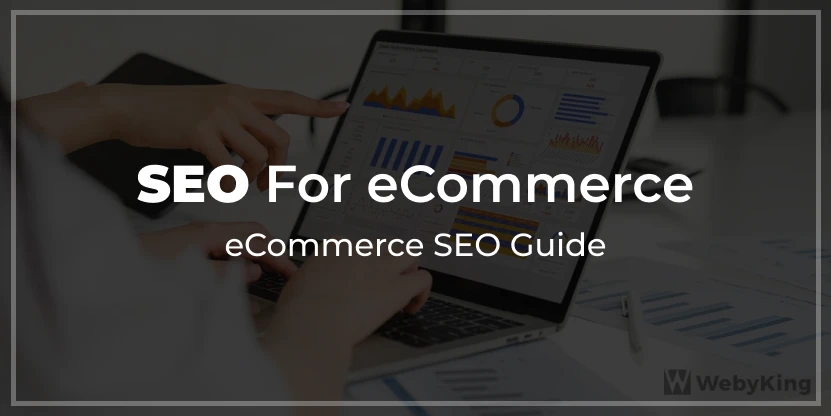
- What is eCommerce SEO and Why It Is Important?
- Top eCommerce SEO Best Practices
- How to Perform an eCommerce SEO Audit
- How Much Does eCommerce SEO Cost in 2026? Pricing, Factors & Budget Planning
- Technical SEO for eCommerce: Complete Optimization Guide for Scalable Growth
- Should You Hire an eCommerce SEO Expert or Do It Yourself?
- eCommerce SEO Trends to Watch in 2026 (Strategic Guide for Online Stores)
Get In Touch
In today’s fast-paced digital world, every online store competes for visibility — and that’s where eCommerce SEO becomes essential.
It’s the backbone of organic growth, helping your products appear in front of the right audience when they’re actively searching to buy.
Whether you run a small business or a large eCommerce brand, optimizing your website for search engines is no longer optional — it’s the difference between getting seen or staying invisible. With millions of online stores vying for attention, strategic SEO helps you stand out, attract qualified traffic, and convert visitors into loyal customers.
Research consistently shows that higher Google visibility directly increases your store’s reach and revenue.
In this complete guide, we’ll break down what eCommerce SEO is, why it’s crucial for your online success, and how to optimize your store step-by-step to rank higher, attract more buyers, and grow sustainably.
Who Can Benefit:
eCommerce SEO is ideal for online retailers, DTC (direct-to-consumer) brands, and small to mid-sized businesses looking to grow visibility, attract consistent organic traffic, and outperform competitors in online search.
Did you know that nearly 53% of all website traffic comes from organic search?
What is eCommerce SEO?
eCommerce SEO is the process of optimizing product pages, category pages, and site structure so your online store ranks higher in Google. This online store SEO approach helps shoppers find your products organically without relying on ads, improving traffic, conversions, and long-term visibility.
In simpler terms, eCommerce SEO makes your website easier for both users and search engines to understand. When your pages are well optimized, your store can rank for high-intent search queries such as “best fitness accessories online” or “buy organic skincare products” — attracting shoppers who are already ready to buy.
Core activities involved in an eCommerce SEO strategy include:
- Conducting keyword research to find profitable and buyer-focused search terms
- Optimizing product pages, categories, and meta elements for higher rankings
- Enhancing site architecture and URL structure for better crawlability
- Creating high-quality backlinks and internal links that build authority
- Making your online store mobile-friendly and improving page speed performance
- Adding structured data (Product, Review, and Breadcrumb schema) to improve click-through rates
Together, these techniques ensure your eCommerce website performs better in search results, driving more qualified traffic and long-term growth without relying heavily on paid ads.
Why is eCommerce SEO Important for Online Stores?
eCommerce SEO is important because it increases your store’s visibility, attracts ready-to-buy customers, and builds long-term trust. Higher rankings lead to more organic traffic, stronger brand authority, and sustainable revenue growth without depending on paid advertising.
In fact, the importance of eCommerce SEO can’t be overstated — a 2023 Sistrix study found that the first organic Google result gets a 28.5% click-through rate (CTR), while the second and third drop to 15% and 11%. For online businesses, that difference translates directly into sales and visibility.
Today’s search results are more dynamic than ever — featuring snippets, AI overviews, “People Also Ask,” and product listings. Optimizing for SEO ensures your products appear in these top placements — exactly where ready-to-buy shoppers are searching.
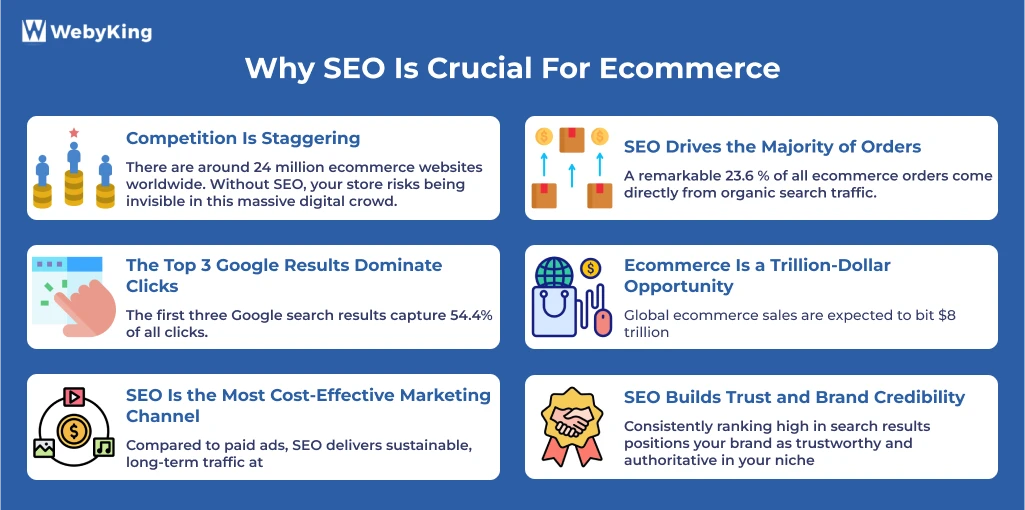
Here’s a closer look at the key benefits of eCommerce SEO and why it’s crucial for online success:
1. Drives High-intent Organic Traffic
SEO helps your eCommerce store attract customers who are already looking for your products. These visitors have strong purchase intent — making them far more likely to convert than casual browsers.
Ranking for buyer-focused keywords like “best smartwatches under $200” or “buy organic skincare online” positions your store in front of people ready to buy.
Organic visitors from SEO typically convert 5–20x higher than general website traffic.
2. Improves Product Discoverability in Crowded Markets
The eCommerce space is saturated — especially in competitive niches like electronics, beauty, and fashion. Strong eCommerce SEO for online stores ensures your products stand out in Google’s results through optimized content, metadata, and structured product data.
Think of eCommerce SEO as your digital storefront: it determines whether shoppers walk into your store or your competitor’s.
With proper product optimization and internal linking, you enhance both visibility and click-through rates — crucial advantages of eCommerce SEO.
For instance, in the beauty niche, ranking for a keyword like “vitamin C serum for oily skin” can significantly outperform broader terms like “skincare products.”
3. Builds Long-Term Brand Authority and Trust
Appearing consistently in top search positions helps build credibility and brand recognition. When customers repeatedly see your name while researching products, they begin to associate your store with expertise and reliability.
Google rewards this visibility with better rankings, as strong content, backlinks, and user engagement enhance E-E-A-T (Experience, Expertise, Authoritativeness, and Trustworthiness).
Example: An eco-conscious yoga brand saw a 34% increase in branded searches after improving its organic rankings — showing how SEO nurtures trust beyond immediate clicks.
4. Enhances User Experience (UX) — Which Google Rewards
Modern SEO is as much about usability as it is about keywords. Optimizing your website for speed, navigation, and mobile performance improves user satisfaction and directly boosts rankings.
Key UX-related SEO improvements include:
- Faster page load time: Approx 53% of users leave if a site takes more than 3 seconds to load.
- Mobile optimization: Over 60% of eCommerce traffic now comes from smartphones.
- Intuitive site structure: Helps Google and customers easily find your products.
In short, SEO enhances both visibility and user experience — improving conversions at every step.
Example: Imagine a shopper opening a product page that takes 5–6 seconds to load — they’re far more likely to exit before seeing your product details.
5. Delivers Sustainable ROI and Reduces Paid Ad Dependency
One of the biggest benefits of SEO in eCommerce websites is cost efficiency. The eCommerce SEO cost is much lower over time compared to paid campaigns, yet it delivers lasting visibility and consistent organic growth.
According to BrightEdge, 53% of all website traffic comes from organic search — higher than paid and social combined.
Example: A health supplement brand shifted $1,200/month from ads to SEO and achieved a 47% rise in organic revenue within nine months — proving SEO’s sustainable ROI.
6. Captures Voice and Local Search Opportunities
Voice assistants and local-intent searches are reshaping how users shop online.
Optimizing your product pages for conversational queries like “Where can I buy vegan protein powder near me?” helps your store appear in voice search results and local packs.
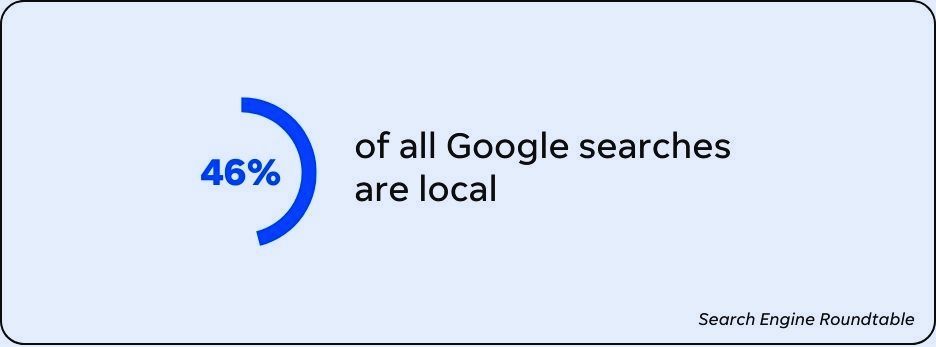
Google reports that 46% of all searches have local intent, making this optimization essential for eCommerce stores with regional fulfillment or pickup options.
If your eCommerce store offers regional delivery, optimizing for local SEO keywords helps capture high-converting, location-based searches.
For example, a query like “buy yoga mats near me” can trigger local pack results if your store offers regional delivery or pickup options.
7. Builds Independence from Marketplaces Like Amazon
Marketplaces offer visibility but often at the cost of profit margins and customer data. Through strong eCommerce SEO, you can attract traffic directly to your own store — gaining full control over pricing, brand experience, and upsells.
Example: A skincare company shifted 30% of its sales from Amazon to its own website by ranking for terms like “best niacinamide serum for sensitive skin.”
8. Future-Proofs Your Online Store
With search evolving rapidly — from AI-generated overviews to visual and predictive search — SEO keeps your business adaptable.
Using structured data, image optimization, and fresh content updates ensures your store remains visible across all new search formats.
Stores using product schema see up to 20% more clicks thanks to enhanced search results showing pricing, reviews, and stock status.
Quick Recap of eCommerce SEO Benefits
- Attracts high-intent, purchase-ready traffic
- Improves product discoverability and UX
- Builds brand authority and customer trust
- Delivers sustainable ROI and cost savings
- Future-proofs your eCommerce website
- Reduces reliance on marketplaces and ads
Conclusion: Build Long-Term Growth with Smart eCommerce SEO
As competition intensifies and AI-driven search evolves, eCommerce SEO remains your most sustainable growth channel. You can hire an eCommerce SEO expert or do it yourself, but consistent optimization and technical precision are key to success.
It doesn’t just attract traffic — it builds credibility, user trust, and long-term profitability.
Whether you’re a small startup or an established eCommerce brand, focusing on SEO ensures your store gets found, remembered, and chosen.
Get a Free eCommerce SEO Audit and discover how professional eCommerce SEO services can help your store attract ready-to-buy customers through sustainable organic strategies.
Frequently Asked Questions
How is eCommerce SEO different from traditional website SEO?
eCommerce SEO focuses on optimizing product pages, category structures, and filtering/navigation for transactional intent, while traditional SEO often emphasises blogs or service pages with informational intent.
What pages should I prioritise first for SEO on my eCommerce store?
Start with your high-performing or high-potential product pages and top-level category pages (your “money pages”). Optimising these for search intent typically delivers faster ROI than focusing only on blogs or About pages.
Does duplicate content hurt SEO on eCommerce product pages?
Yes. Using manufacturer descriptions repeatedly or very thin product copy can irritate search engines and dilute rankings. Always aim for unique, keyword-optimised descriptions for each SKU (Stock Keeping Unit).
How important are product reviews for eCommerce SEO?
Very important. Reviews add fresh, user-generated content, help you target long-tail keywords, and when marked up with schema, can improve click-through in search results.
Can filters and faceted navigation hurt SEO?
Yes—if not handled correctly. Filters can produce hundreds of URL variations, causing duplicate content and crawl inefficiencies. Use canonical tags, parameter blocking, or robots directives to manage these.
Do eCommerce stores still need blogs for SEO?
Absolutely. Blogs target informational keywords, support top-of-funnel traffic, build authority, and link internally to product/category pages—boosting overall SEO performance.
How often should I update SEO elements like titles and descriptions?
Review your titles, meta descriptions, and on-page elements every 3 to 6 months—or sooner after major product launches or seasonal changes—to keep content aligned with search trends and user intent.
Does schema markup help eCommerce SEO?
Yes. Structured data (Product, Review, Breadcrumb schema) makes your listings more appealing in SERPs, often improving visibility and click-through rates.
What’s the role of technical SEO in an eCommerce store?
Technical SEO ensures your site’s architecture, mobile performance, load speed, and crawl/indexing setup are solid. Without it, even the best content and links may not perform.
How much does eCommerce SEO cost and is it worth the investment?
Costs vary depending on store size, competition, and complexity. However, because organic search traffic converts well and builds over time, investing in eCommerce SEO typically offers stronger long-term ROI than short-term paid campaigns.

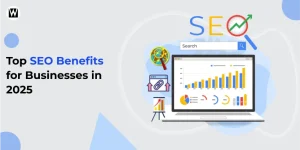
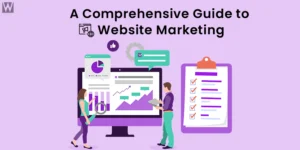


![How to Build an eCommerce Website From Scratch? [A Step-By-Step Guide]](https://www.webyking.com/wp-content/uploads/2023/05/how-to-build-an-ecommerce-website-from-scratch-a-step-by-step-guide-1x-300x150.webp)
![How Much Does An Ecommerce Website Cost In 2026 [A Complete Pricing Guide] Featured Image of eCommerce Website Cost](https://www.webyking.com/wp-content/uploads/2021/12/ecommerce-website-cost-300x150.webp)









